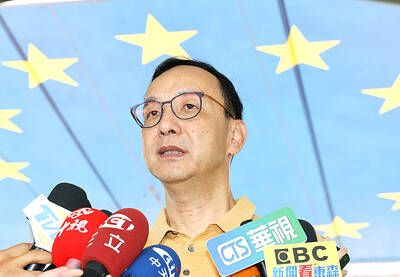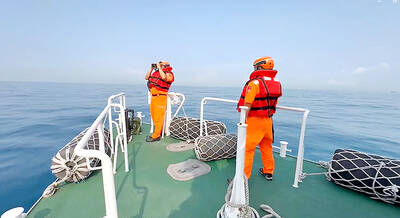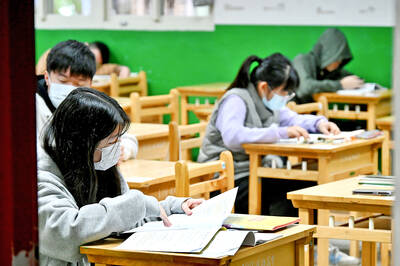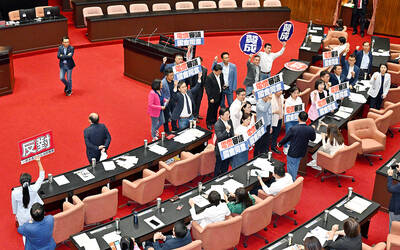Aboriginal rights activists and politicians yesterday clashed with police as they tried to get into the Chinese Nationalist Party (KMT) legislative caucus office to deliver a petition voicing their opposition to the Executive Yuan’s draft Aboriginal autonomy bill.
“[KMT caucus whip] Lin Yi-shih (林益世) come out! Lin Yi-shih, come out!” dozens of Aborigines shouted as they protested outside the KMT’s caucus office.
They were eager to get into the office to deliver a petition to voice their opposition to the draft bill, which they consider a “fake autonomy bill” as it gives Aborigines neither a budgetary increase nor the right to land and natural resources.
Although the caucus office eventually allowed them in, no one was there to take their petition and several protestors with KMT membership threatened to withdraw from the party.
Things went more smoothly when they visited the Democratic Progressive Party (DPP) caucus office, as DPP Legislator Lin Shu-fen (林淑芬) received them and promised to stand with them on the autonomy issue.
Outside the Legislative Yuan, there were hundreds of other protestors.
“We are here to defend our rights,” former DPP legislator Payen Talu of the Atayal tribe told the crowd that represented all 14 officially recognized Aboriginal tribes in the country.
“What good would an autonomy bill do us if it will not give us the right to fully manage our own traditional domains and natural resources within — as the Aboriginal Basic Act [原住民族基本法] promises — and will not allow autonomous regions to receive budgets directly from the central government?” Payen said.
Payen and the demonstrators were upset because the Executive Yuan’s version of the draft bill keeps major decision-making powers in the hands of existing central and local government organizations, leaving mostly culture-related policy-making power to Aboriginal autonomous regions.

GOOD DIPLOMACY: The KMT has maintained close contact with representative offices in Taiwan and had extended an invitation to Russia as well, the KMT said The Chinese Nationalist Party (KMT) would “appropriately handle” the fallout from an invitation it had extended to Russia’s representative to Taipei to attend its international banquet last month, KMT Chairman Eric Chu (朱立倫) said yesterday. US and EU representatives in Taiwan boycotted the event, and only later agreed to attend after the KMT rescinded its invitation to the Russian representative. The KMT has maintained long-term close contact with all representative offices and embassies in Taiwan, and had extended the invitation as a practice of good diplomacy, Chu said. “Some EU countries have expressed their opinions of Russia, and the KMT respects that,” he

An increase in Taiwanese boats using China-made automatic identification systems (AIS) could confuse coast guards patrolling waters off Taiwan’s southwest coast and become a loophole in the national security system, sources familiar with the matter said yesterday. Taiwan ADIZ, a Facebook page created by enthusiasts who monitor Chinese military activities in airspace and waters off Taiwan’s southwest coast, on Saturday identified what seemed to be a Chinese cargo container ship near Penghu County. The Coast Guard Administration went to the location after receiving the tip and found that it was a Taiwanese yacht, which had a Chinese AIS installed. Similar instances had also

CHANGES: After-school tutoring periods, extracurricular activities during vacations or after-school study periods must not be used to teach new material, the ministry said The Ministry of Education yesterday announced new rules that would ban giving tests to most elementary and junior-high school students during morning study and afternoon rest periods. The amendments to regulations governing public education at elementary schools and junior high schools are to be implemented on Aug. 1. The revised rules stipulate that schools are forbidden to use after-school tutoring periods, extracurricular activities during summer or winter vacation or after-school study periods to teach new course material. In addition, schools would be prohibited from giving tests or exams to students in grades one to eight during morning study and afternoon break periods, the

AMENDMENT: Contact with certain individuals in China, Hong Kong and Macau must be reported, and failure to comply could result in a prison sentence, the proposal stated The Chinese Nationalist Party (KMT) and the Taiwan People’s Party (TPP) yesterday voted against a proposed bill by Democratic Progressive Party (DPP) lawmakers that would require elected officials to seek approval before visiting China. DPP Legislator Puma Shen’s (沈伯洋) proposed amendments to the Act Governing Relations Between the People of the Taiwan Area and the Mainland Area (臺灣地區與大陸地區人民關係條例), stipulate that contact with certain individuals in China, Hong Kong and Macau should be reported, while failure to comply would be punishable by prison sentences of up to three years, alongside a fine of NT$10 million (US$309,041). Fifty-six voted with the TPP in opposition